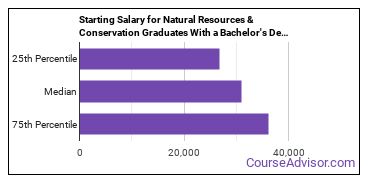Natural Resources & Conservation
Featured schools near , edit
Types of Degrees Natural Resources & Conservation Majors Are Getting
The following table lists how many natural resources and conservation graduations there were in 2020-2021 for each degree level.
| Education Level | Number of Grads |
|---|---|
| Bachelor’s Degree | 21,743 |
| Master’s Degree | 4,521 |
| Associate Degree | 1,625 |
| Basic Certificate | 1,207 |
| Graduate Certificate | 613 |
| Doctor’s Degree | 610 |
| Undergraduate Certificate | 184 |
What Natural Resources & Conservation Majors Need to Know
O*NET surveyed people in occupations related to natural resources and conservation and asked them what knowledge areas, skills, and abilities were important for their jobs. The responses were rated on a scale of 1 to 5 with 5 being most important.
Knowledge Areas for Natural Resources & Conservation Majors
Natural Resources and Conservation majors often go into careers in which the following knowledge areas are important:

- English Language - Knowledge of the structure and content of the English language including the meaning and spelling of words, rules of composition, and grammar.
- Law and Government - Knowledge of laws, legal codes, court procedures, precedents, government regulations, executive orders, agency rules, and the democratic political process.
- Customer and Personal Service - Knowledge of principles and processes for providing customer and personal services. This includes customer needs assessment, meeting quality standards for services, and evaluation of customer satisfaction.
- Administration and Management - Knowledge of business and management principles involved in strategic planning, resource allocation, human resources modeling, leadership technique, production methods, and coordination of people and resources.
- Education and Training - Knowledge of principles and methods for curriculum and training design, teaching and instruction for individuals and groups, and the measurement of training effects.
Skills for Natural Resources & Conservation Majors
The following list of skills has been highlighted as some of the most essential for careers related to natural resources and conservation:

- Critical Thinking - Using logic and reasoning to identify the strengths and weaknesses of alternative solutions, conclusions or approaches to problems.
- Active Listening - Giving full attention to what other people are saying, taking time to understand the points being made, asking questions as appropriate, and not interrupting at inappropriate times.
- Speaking - Talking to others to convey information effectively.
- Reading Comprehension - Understanding written sentences and paragraphs in work related documents.
- Monitoring - Monitoring/Assessing performance of yourself, other individuals, or organizations to make improvements or take corrective action.
Abilities for Natural Resources & Conservation Majors
A major in natural resources and conservation will prepare for your careers in which the following abilities are important:

- Oral Expression - The ability to communicate information and ideas in speaking so others will understand.
- Oral Comprehension - The ability to listen to and understand information and ideas presented through spoken words and sentences.
- Problem Sensitivity - The ability to tell when something is wrong or is likely to go wrong. It does not involve solving the problem, only recognizing there is a problem.
- Deductive Reasoning - The ability to apply general rules to specific problems to produce answers that make sense.
- Written Comprehension - The ability to read and understand information and ideas presented in writing.
What Can You Do With a Natural Resources & Conservation Major?
Below is a list of occupations associated with natural resources and conservation:
Who Is Getting a Bachelor’s Degree in Natural Resources & Conservation?
Racial-Ethnic Diversity
At the countrywide level, the racial-ethnic distribution of natural resources and conservation majors is as follows:

| Race/Ethnicity | Number of Grads |
|---|---|
| Asian | 954 |
| Black or African American | 579 |
| Hispanic or Latino | 2,528 |
| White | 15,257 |
| International Students | 512 |
| Other Races/Ethnicities | 1,913 |
Geographic Diversity
Students from other countries are interested in Natural Resources & Conservation, too. About 2.4% of those with this major are international students.
How Much Do Natural Resources & Conservation Majors Make?
Bachelor’s Degree Starting Salary
Data from the U.S. Department of Education shows that natural resources and conservation students who graduated in 2017-2019 with a bachelor’s degree made a median starting salary of $31,005 per year. During this timeframe, most salaries fell between $26,884 (25th percentile) and $36,089 (75th percentile).

One thing to note here is that not all of these people may be working in careers related to natural resources and conservation.
Salaries According to BLS
Natural Resources and Conservation majors often go into careers where salaries can range from $53,240 to $80,310 (25th to 75th percentile). This range includes all degree levels, so the salary for a person with just a bachelor’s degree may be a little less and the one for a person with an advanced degree may be a little more.
To put that into context, according to BLS data from the first quarter of 2020, the typical high school graduate makes between $30,000 and $57,900 a year (25th through 75th percentile). The average person with a bachelor’s degree (any field) makes between $45,600 and $99,000. Advanced degree holders make the most with salaries between $55,600 and $125,400.
Amount of Education Required for Careers Related to Natural Resources & Conservation
Some degrees associated with natural resources and conservation may require an advanced degree, while others may not even require a bachelor’s in the field. In general, the more advanced your degree the more career options will open up to you. However, there is significant time and money that needs to be invested into your education so weigh the pros and cons.
Find out what the typical degree level is for natural resources and conservation careers below.

| Education Level | Percentage of Workers |
|---|---|
| Less than a High School Diploma | 4.6% |
| High School Diploma - or the equivalent (for example, GED) | 15.3% |
| Post-Secondary Certificate - awarded for training completed after high school (for example, in agriculture or natural resources, computer services, personal or culinary services, engineering technologies, healthcare, construction trades, mechanic and repair technologies, or precision production) | 6.4% |
| Some College Courses | 7.5% |
| Associate’s Degree (or other 2-year degree) | 7.1% |
| Bachelor’s Degree | 31.9% |
| Post-Baccalaureate Certificate - awarded for completion of an organized program of study; designed for people who have completed a Baccalaureate degree but do not meet the requirements of academic degrees carrying the title of Master. | 1.5% |
| Master’s Degree | 12.8% |
| Post-Master’s Certificate - awarded for completion of an organized program of study; designed for people who have completed a Master’s degree but do not meet the requirements of academic degrees at the doctoral level. | 0.5% |
| First Professional Degree - awarded for completion of a program that: requires at least 2 years of college work before entrance into the program, includes a total of at least 6 academic years of work to complete, and provides all remaining academic requirements to begin practice in a profession. | 0.8% |
| Doctoral Degree | 8.4% |
| Post-Doctoral Training | 3.8% |
Online Natural Resources & Conservation Programs
In 2020-2021, 1,160 schools offered a natural resources and conservation program of some type. The following table lists the number of programs by degree level, along with how many schools offered online courses in the field.
| Degree Level | Colleges Offering Programs | Colleges Offering Online Classes |
|---|---|---|
| Certificate (Less Than 1 Year) | 0 | 0 |
| Certificate (1-2 years) | 75 | 3 |
| Certificate (2-4 Years) | 2 | 0 |
| Associate’s Degree | 387 | 16 |
| Bachelor’s Degree | 118 | 31 |
| Post-Baccalaureate | 0 | 0 |
| Master’s Degree | 423 | 30 |
| Post-Master’s | 10 | 0 |
| Doctor’s Degree (Research) | 179 | 0 |
| Doctor’s Degree (Professional Practice) | 0 | 0 |
| Doctor’s Degree (Other) | 0 | 0 |
Is a Degree in Natural Resources & Conservation Worth It?
The median salary for a natural resources and conservation grad is $65,320 per year. This is based on the weighted average of the most common careers associated with the major.
This is 64% more than the average salary for an individual holding a high school degree. This adds up to a gain of about $508,400 after 20 years!

Top Ranking Lists for Natural Resources & Conservation
Explore Major by State
Alabama
California
District of Columbia
Idaho
Kansas
Maryland
Mississippi
Nevada
New York
Oklahoma
South Carolina
Utah
West Virginia
Alaska
Colorado
Florida
Illinois
Kentucky
Massachusetts
Missouri
New Hampshire
North Carolina
Oregon
South Dakota
Vermont
Wisconsin
Majors Related to Natural Resources & Conservation
You may also be interested in one of the following majors related to natural resources and conservation.
| Major | Number of Grads |
|---|---|
| Computer & Information Sciences | 254,454 |
| Engineering | 198,468 |
| Biological & Biomedical Sciences | 177,778 |
| Engineering Technologies | 85,188 |
| Mathematics & Statistics | 52,396 |
| Physical Sciences | 50,306 |
| Agriculture & Agriculture Operations | 49,899 |
| Architecture & Related Services | 17,325 |
| Communications Technologies & Support | 14,826 |
| Science Technologies / Technicians | 6,451 |
References
*The racial-ethnic minorities count is calculated by taking the total number of students and subtracting white students, international students, and students whose race/ethnicity was unknown. This number is then divided by the total number of students at the school to obtain the racial-ethnic minorities percentage.
- College Factual
- College Scorecard
- National Center for Education Statistics
- O*NET Online
- U.S. Bureau of Labor Statistics
- Usual Weekly Earnings of Wage and Salary Workers First Quarter 2020
- Image Credit: By Lynn Betts under License
More about our data sources and methodologies.
Featured Schools
 Request Info
Request Info
|
Southern New Hampshire University You have goals. Southern New Hampshire University can help you get there. Whether you need a bachelor's degree to get into a career or want a master's degree to move up in your current career, SNHU has an online program for you. Find your degree from over 200 online programs. Learn More > |

